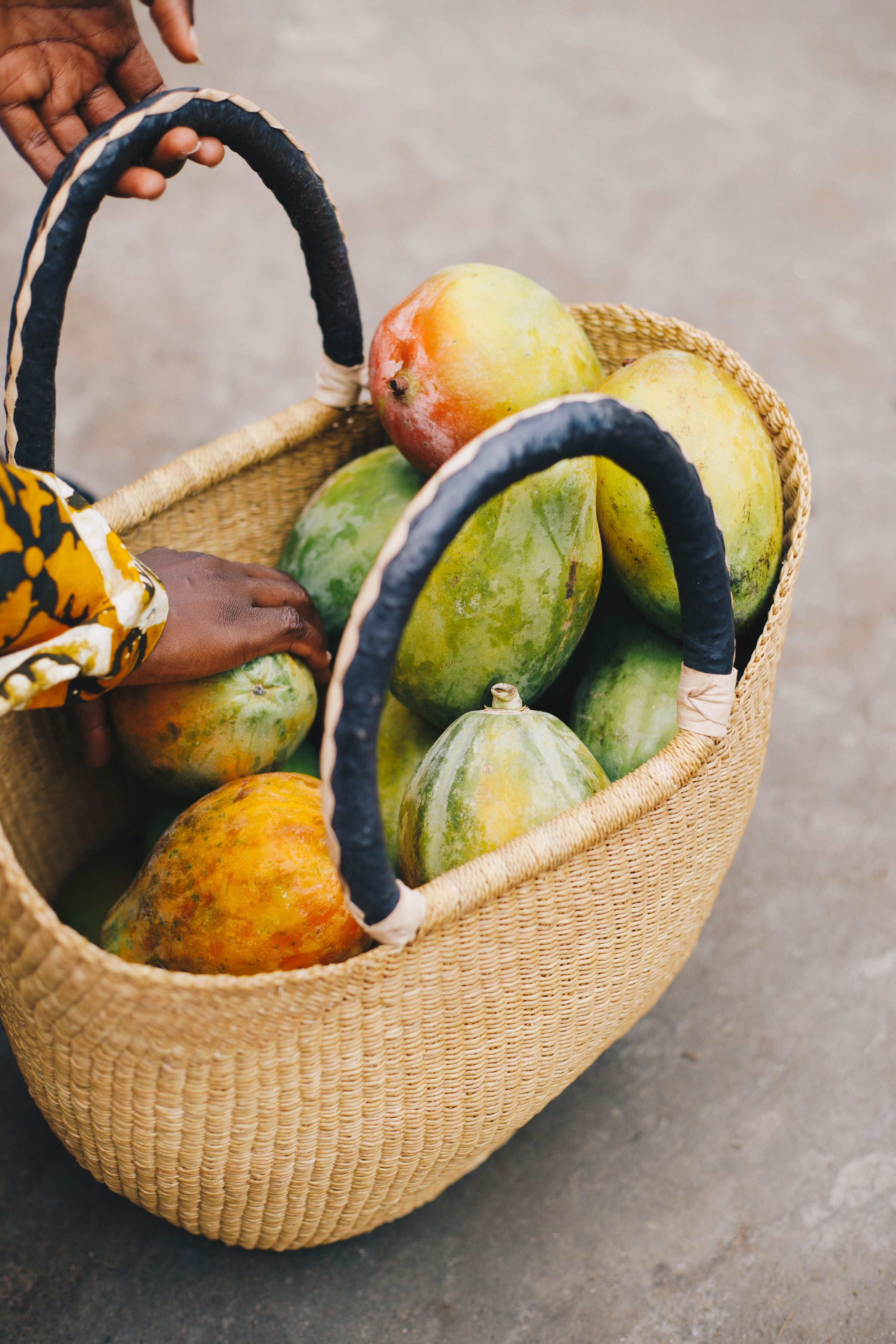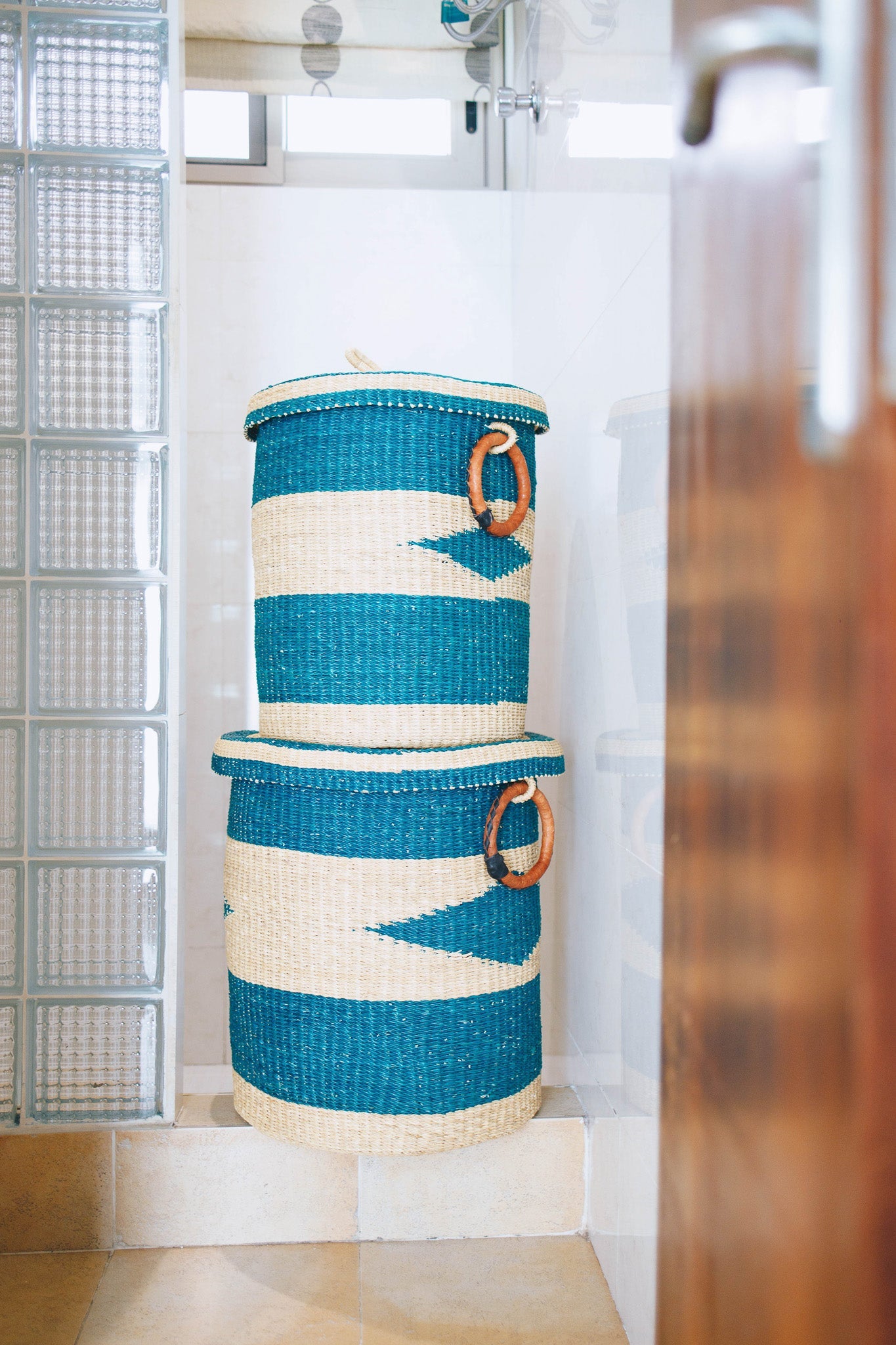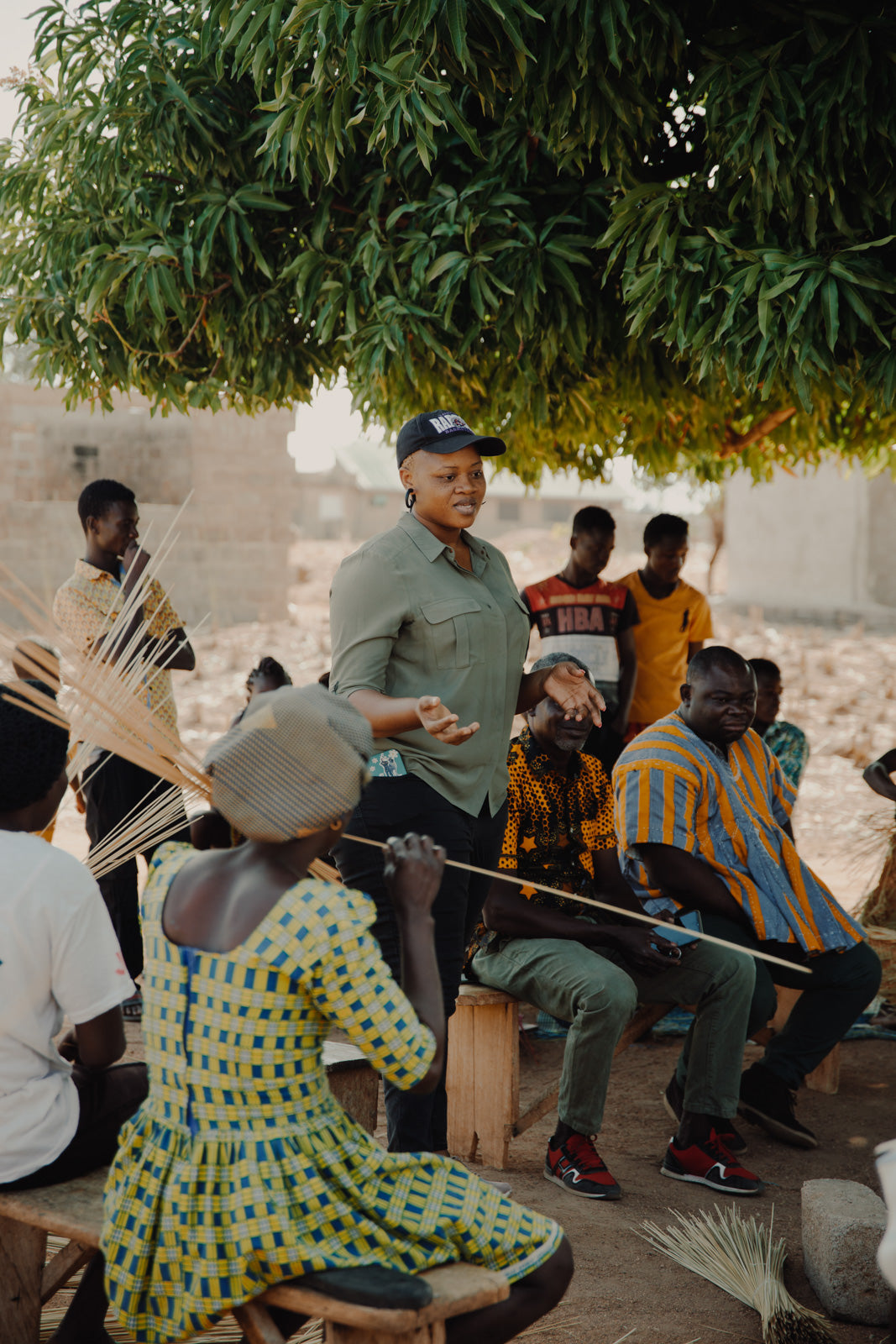
In the Bolga region, weaving has been practised for generations. Every Frafra basket is crafted from Veta Vera Grass, a resilient grass flourishing in central Ghana. This natural material is carefully dried and then transported northward to Bolga. In Bolga, weavers split each straw vertically, creating a core strength by tightly twisting them back together. Bunches of straw are hand-dyed in water, and with care, weavers handpick the strands for the base, sides, and handle. Starting from the base and ascending, the weaving process takes form. Rims are expertly finished flat or enclosed with straw, creating a distinctive tube-like edge. Working meticulously, crafting a single basket typically spans 2-5 days. The handles are then fashioned from locally sourced goat leather, skilfully made by adept local tanners.
Thoughtful design and creativity has always been intrinsic to the long tradition of basket weaving in Bolga. It's important to us that that the inherent creativity behind every basket does not change. Every basket is distinct, distinguished by the hand-dyed colours and patterns designed by the weaver who wove it.
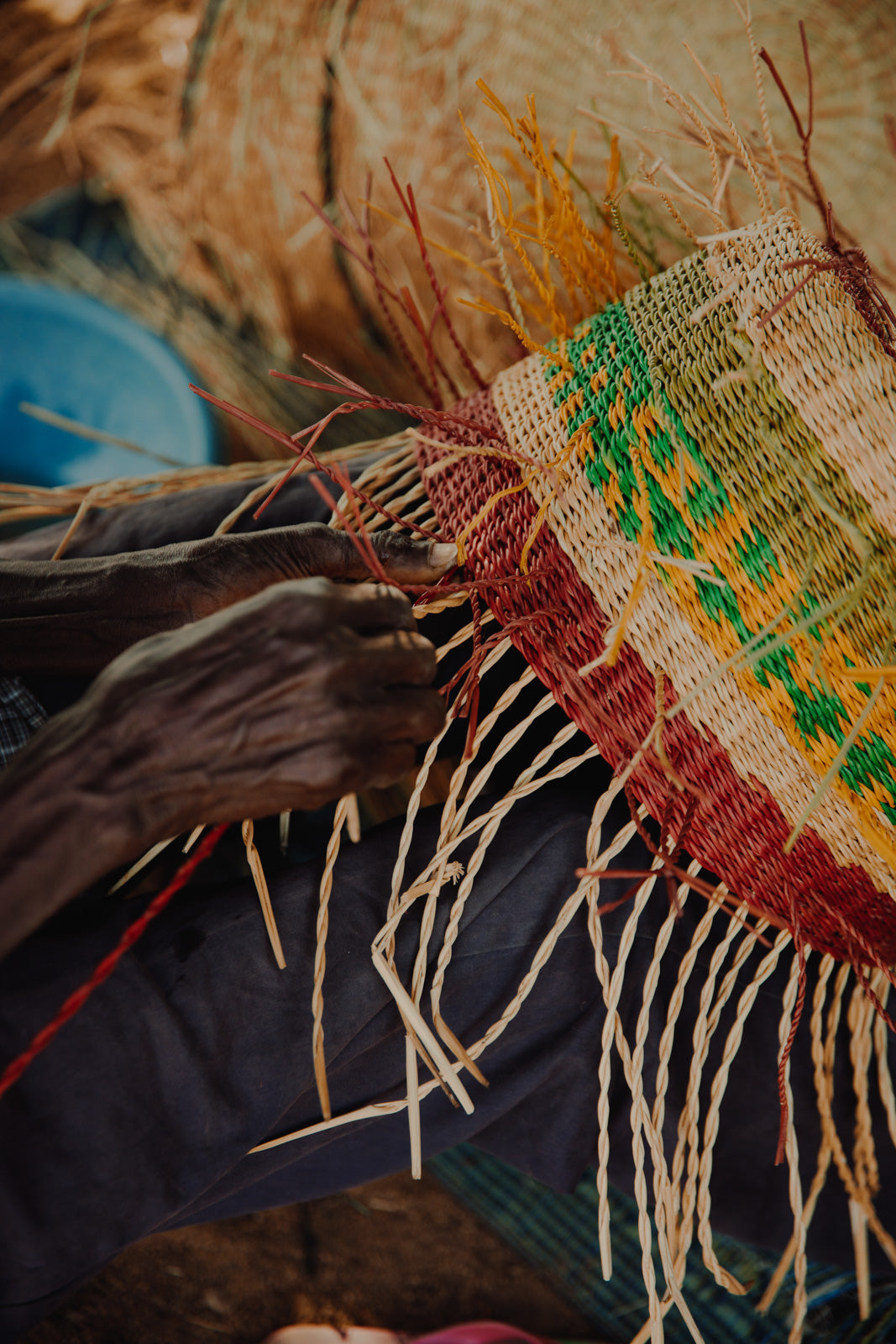
Bolgatanga, also known as Bolga, is located in the Upper East Region of Ghana. The region experiences an arid climate with a brief rainy season from April to October. Unlike some other rural areas in Ghana, lower soil fertility necessitates different sources of income beyond agriculture alone. In addition to farming, communities weave baskets, providing an important supplementary income. This diversity ensures a stable livelihood year-round.
At Frafra, we bring the expert craftsmanship of Bolgatanga's weavers to the UK. The baskets not only showcase exceptional skill but also support sustainable livelihoods.
In the Bolga region, weaving has been practised for generations. Every Frafra basket is crafted from Veta Vera Grass, a resilient grass flourishing in central Ghana. This natural material is carefully dried and then transported northward to Bolga. In Bolga, weavers split each straw vertically, creating a core strength by tightly twisting them back together. Bunches of straw are hand-dyed in water, and with care, weavers handpick the strands for the base, sides, and handle. Starting from the base and ascending, the weaving process takes form. Rims are expertly finished flat or enclosed with straw, creating a distinctive tube-like edge. Working meticulously, crafting a single basket typically spans 2-5 days. The handles are then fashioned from locally sourced goat leather, skilfully made by adept local tanners.
Thoughtful design and creativity has always been intrinsic to the long tradition of basket weaving in Bolga. It's important to us that that the inherent creativity behind every basket does not change. Every basket is distinct, distinguished by the hand-dyed colours and patterns designed by the weaver who wove it.
Bolgatanga, also known as Bolga, is located in the Upper East Region of Ghana. The region experiences an arid climate with a brief rainy season from April to October. Unlike some other rural areas in Ghana, lower soil fertility necessitates different sources of income beyond agriculture alone. In addition to farming, communities weave baskets, providing an important supplementary income. This diversity ensures a stable livelihood year-round.
At Frafra, we bring the expert craftsmanship of Bolgatanga's weavers to the UK. The baskets not only showcase exceptional skill but also support sustainable livelihoods.


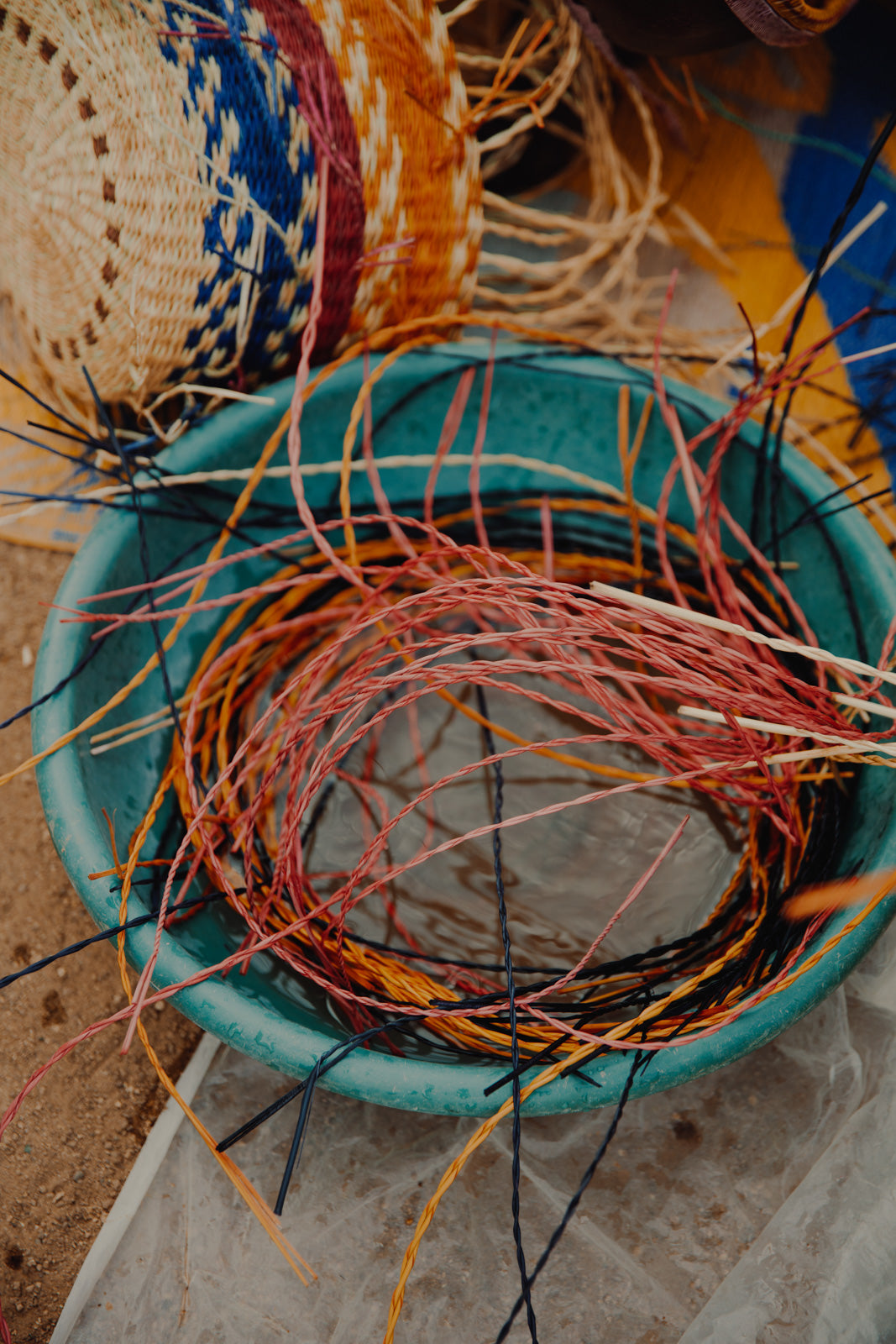
Established in Ghana and based in the UK, Frafra Baskets is a team of 150 weavers in Bolga, Upper East Region of Ghana; Bernard Ankomah who leads all our systems and sustainability in Ghana with Samuel Asaah, whilst Founding Director, Bartie Stagg and Managing Director Olivia Peterson work in Ghana and the UK to build sales and collaborations, and Izzie O'Brien, UK Stock and System's Lead, manages stock and dispatch. Working together without middlemen ensures ethical, economically and environmentally sustainable production. We work collectively to improve product quality, access to the UK and European markets and unlock higher financial returns for each community. Baskets are woven in groups or within a weaver's own home and at a pace that suits family, agricultural and educational commitments.
Our mission is to provide high-quality woven products to you while bringing about meaningful change for every weaver and ensuring weaving continues for generations to come. Beyond ensuring a fair wage, we are building indoor weaving and training spaces, providing wheelchairs for older weavers, an educational fund for promising students who want to attend university or teacher training, and sourcing improved colour dyes.

In Ghana
Bartie Stagg, Founding Director, who has lived and worked in Ghana across the agricultural sector for the last ten years.
Pokka Daa, Head of Weavers and Material Sourcing, who was born in Bolga and attended Fashion and Design school in Ghana before starting to work in the basket weaving sector.
Bernard Ankomah, Ghana System's Manager and Sustainability Lead. From Ghana, Bernard previously worked for Black Buffalo International organising and training over 1400 weavers.
One-hundred and fifty weavers and tanners across ten communities in Bolga, North Ghana. We work with communities in Bongo, Gambigo, Sumbrungu, Zaare and Zoko.
In the UK
Olivia Peterson, Managing Director, who has worked across Africa and Europe in the contemporary African art and marketing space since graduating SOAS with an MA in Contemporary African Art.
Izzie O'Brien, UK Stock and Systems Lead, has just successfully completed her BA in Textiles at Nottingham Trent University.
Established in Ghana and based in the UK, Frafra Baskets is a team of 150 weavers in Bolga, Upper East Region of Ghana; Bernard Ankomah who leads all our systems and sustainability in Ghana with Samuel Asaah, whilst Founding Director, Bartie Stagg and Managing Director Olivia Peterson work in Ghana and the UK to build sales and collaborations, and Izzie O'Brien, UK Stock and System's Lead, manages stock and dispatch. Working together without middlemen ensures ethical, economically and environmentally sustainable production. We work collectively to improve product quality, access to the UK and European markets and unlock higher financial returns for each community. Baskets are woven in groups or within a weaver's own home and at a pace that suits family, agricultural and educational commitments.
Our mission is to provide high-quality woven products to you while bringing about meaningful change for every weaver and ensuring weaving continues for generations to come. Beyond ensuring a fair wage, we are building indoor weaving and training spaces, providing wheelchairs for older weavers, an educational fund for promising students who want to attend university or teacher training, and sourcing improved colour dyes.
In Ghana
Bartie Stagg, Founding Director, who has lived and worked in Ghana across the agricultural sector for the last ten years.
Pokka Daa, Head of Weavers and Material Sourcing, who was born in Bolga and attended Fashion and Design school in Ghana before starting to work in the basket weaving sector.
Bernard Ankomah, Ghana System's Manager and Sustainability Lead. From Ghana, Bernard previously worked for Black Buffalo International organising and training over 1400 weavers.
One-hundred and fifty weavers and tanners across ten communities in Bolga, North Ghana. We work with communities in Bongo, Gambigo, Sumbrungu, Zaare and Zoko.
In the UK
Olivia Peterson, Managing Director, who has worked across Africa and Europe in the contemporary African art and marketing space since graduating SOAS with an MA in Contemporary African Art.
Izzie O'Brien, UK Stock and Systems Lead, has just successfully completed her BA in Textiles at Nottingham Trent University.


Policies.
Bribery and Anti-Corruption Policy
This policy sets out what we must all do to help prevent bribery in all its forms, in accordance with our Bribery and Anti-Corruption statement. FBL is committed to erasing corruption wherever it does business as far as we are able to do so, in accordance with local and international legislation, and hand in hand with the Anti-Corruption Commission (ACC). This policy is to be read and issued to all employees.
The FBL Anti-Bribery policy is mandatory for all FBL employees, agents, intermediaries, consultants, distributors, sub-contractors, suppliers and partners working on the Company’s behalf.
It is important that you take the time to read and comply with this Policy. The prevention, detection and reporting of any bribery in any form is the responsibility of all employees across FBL and all individuals and entities over which FBL has control. Appropriate confidential channels for employees and Business Partners are in place to report any suspicion of bribery, these are described later in this Policy. Any failure to comply with this Policy will be treated seriously and may result in disciplinary action.
It is the duty of any employee, staff member, contractor, supplier, or other stakeholder in FBL activities to report corruption where they see it, and speak up under our whistle blowing policy by either speaking to management, or the CEO, or acting in accordance with our whistle blowing policy to have confidentiality boxes in our nursery and office facilities.
You must read and abide by the terms of this Policy.
What is a Bribe?
A bribe may include any payment, benefit or gift offered or given with the purpose of influencing a decision or outcome. The bribe may not always be of a large value.
If you are ever in doubt about a situation with which you are presented, always seek advice.
Any act of bribery, in whatever form is unacceptable. We will consider taking disciplinary action against anyone who fails to comply with the anti-bribery policy up to and including dismissal and criminal charges. Failure to comply with this policy may also leave you open to a criminal prosecution by the Anti-Corruption Commission or the UK Bribery Act. An offence under the Act can result in an unlimited fine and/or up to a maximum of 10 years imprisonment.
Prohibited conduct
The following conduct is absolutely prohibited under this Policy:
• making unofficial payments to officials in order to obtain any permission, permit or stamp
particularly in connection with importing or exporting goods;
• appointing any third party or supplier to act on behalf of FBL who you know or have good
reason to believe to have engaged in any corrupt or unlawful conduct; or
• making any unlawful payment
Facilitation payments
Facilitation payments (‘facilitating’, ‘speed’ ‘back-hander’ or ‘grease’ payments) are any payments, usually small cash payments made to low-level officials, as a bribe to secure or expedite the performance of a routine or necessary action or level of service.
FBL employees or Business Partners must never offer, pay, solicit or accept bribes in any form, including facilitation payments.
Exception:
The only exception to paying a facilitation payment is where your life is in danger. If a facilitation payment is made in such circumstances, it must be reported as soon as practicable or possible to the CEO.
FBL employees and Business Partners should report, via our confidential whistle blowing box in the office, any instances of corruption amongst staff or contractors.
Gifts and Entertainment
All FBL employees are expected to conduct themselves with integrity, impartiality and honesty at all times. Accordingly, all employees are required to follow these rules on Gifts, Hospitality and Entertainment.
You must maintain a high standard of professionalism and not open yourself up to suspicion of dishonesty or put yourself in a position of conflict between your work and your private interests. Gifts and entertainment given and received as a reward, inducement or encouragement for preferential treatment or inappropriate or dishonest conduct are strictly prohibited. In particular, no gifts, hospitality or entertainment may be given or accepted during a tender process or during contractual negotiations if there is any realistic risk that such gifts or entertainment could influence the outcome of such processes or negotiations.
It is important that all FBL employees’ actions are able to withstand scrutiny, and not cause any embarrassment to the Company, yourself or any third party, including contractors or suppliers.
Receiving and giving gifts
You may accept low value token gifts such as branded pens, stationery and mouse mats produced for the purpose of being given away, if given by an existing supplier. Occasional boxes of confectionery, etc may be given to a department as opposed to an individual. Otherwise you must refuse personal gifts such as Christmas, wedding or birthday gifts, including vouchers or cash equivalents, received from franchise partners, suppliers, clients and other third parties.
In some circumstances, a gift can be accepted and a reciprocal gift of a reasonable value may be given, if approved by the CEO. However, the accepted gift should be entered into a raffle with the proceeds donated to charity.
Hospitality/Entertainment
FBL employees may occasionally receive invitations from suppliers or others to corporate hospitality or entertainment events.
Hospitality or entertainment may only be accepted if:-
• employees or personnel from the supplier are in attendance;
• the supplier does not pay any accommodation or (more than trivial) travel expenses for FBL employees;
• the entertainment and/or acceptance of it could not be interpreted as a reward,
inducement or encouragement for a favour or preferential treatment; and
• it is not unduly lavish or extravagant.
Reciprocal hospitality may be offered but needs to be approved by the CEO.
Political Contributions
FBL does not make contributions or donations to political organisations or independent candidates, nor does it incur any political expenditure.
We respect the right of individual employees to make personal contributions, provided they are not made in any way to obtain advantage in a business transaction.
FBL communicates views to government and others, on matters which affect its business interests or those of its shareholders and employees, as a way of assisting in the development of regulation and legislation affecting the business.
Speaking Up – Reporting Bribery
FBL aims to conduct business with the highest standards of ethics, honesty and integrity, and recognises that you have an important role to play in maintaining this aim. Any employee concerned about any form of malpractice, improper action, or wrongdoing by the Company, its employees or other stakeholders are strongly encouraged to report the matter through the dedicated whistle blowing box in the office and in the nursery.
We believe it is essential to create an environment in which you feel able to raise any matters of genuine concern internally without fear of disciplinary action being taken against you, that you will be taken seriously, and that the matters will be investigated appropriately and as far as practicable be kept confidential.
FBL believes that any employee with knowledge of bribery in any form should not remain silent. We take all matters of malpractice, improper action or wrongdoing very seriously and you are strongly encouraged to raise incidents or behaviours that are not in accordance with the policy, by delivering a confidential note into the whistle blowing box.
The Company recognises that there may be some cases where no wrongdoing is found through internal procedures. Protection will be given and no disciplinary action taken if the disclosure is reasonable, made in good faith and the information believed to be true.
Diversity and Inclusion Policy
1. Applicability
This policy applies to:
1.1 All Frafra Baskets employees, contractors and shareholders.
2. Policy Statement
2.1 Frafra Baskets is committed to supporting diversity and to creating an inclusive culture for all its employees. Our business is about people and we strive to create an environment responsive to different cultures and groups in all our interactions with employees, customers, visitors, suppliers, contractors, shareholders, investors and in the communities in which we operate.
2.2 Frafra Baskets is proud to recognise the value and potential that all of our people bring to the workplace regardless of:
• Age
• Disability
• Gender
• Gender Reassignment
• Marital and Civil Partnership status
• Pregnancy & maternity
• Race
• Religion or belief or absence of religion or belief
• Sexual orientation
As part of our mission, we believe that every employee has the right to be treated with respect and dignity throughout their employment with Frafra Baskets and not to be discriminated against. We have a zero tolerance attitude to bullying, harassment or victimisation of any kind.
2.3 Frafra Baskets resolves going above and beyond the minima set out in legislation and we will pro-actively encourage a culture that supports diversity and equal opportunity in all cases.
3. Company Responsibilities
3.1 To actively support diversity and inclusion and to ensure that all our employees are valued and treated with dignity and respect.
3.2 To continually strive to provide employees with a working environment that is free from discrimination, including close oversight of working practices by senior management.
3.3 To ensure managers work in partnership with employees to create and sustain an inclusive working environment where everyone’s unique contribution is valued.
3.4 To ensure that decisions affecting employment, training, promotion and career development are based on an individual’s ability and genuine occupational requirements.
3.5 To comply with relevant legislation by requiring all employees to meet the minimum standards of behaviour and conduct in relation to how they treat their colleagues and other people they have contact with as part of their work with Frafra Baskets.
3.6 To regularly review the policy, its practical application and make any updates to continue to work towards identifying and eliminating any discriminatory practices.
3.7 To provide employees and managers with the appropriate information, via this Policy, on diversity and inclusion in the workplace. As well as to provide diversity & inclusion training for all employees as appropriate.
3.8 To make adjustments to meet the needs of disabled employees, workers and customers where reasonable and practicable to do so.
3.9 To ensure all internal publications and material reflect, in the language and images, the diversity of our employees and customers.
3.10 To provide products and services to our customers and clients without any form of unlawful discrimination and/or harassment.
4. Employee Responsibilities
4.1 To familiarise themselves with this policy and to act in accordance with Frafra Baskets commitment to diversity and inclusion at all times.
4.2 Not to discriminate against colleagues and other people they have contact with as part of their work with Frafra Baskets, treating everyone with respect and helping to create an environment that is free from discrimination and/or harassment of any kind.
4.3 To be sensitive to the potential impact of their behaviour on colleagues, customers, visitors, suppliers and contractors.
4.4 To work in partnership with managers to create and sustain an inclusive working environment, in which everyone’s unique contribution is valued.
4.5 To co-operate with managers in the elimination of any discriminatory practices and/or harassment that may be identified.
5. Recruitment and Selection
5.1 Frafra Baskets endeavours to attract applications from all sections of society and we strive to reflect the diversity of the communities in which we operate.
5.2 We will ensure fair treatment through the recruitment process. This includes:
- Checking that job statements are relevant and non-discriminatory.
- Ensuring that the wording and images used in job adverts reflect and appeal to all sections of society and comply with the law.
- Short-listing only those people whose skills and qualifications most closely match the job statement.
- Asking fair, objective and consistent competency based questions at interview
- Keeping records of the recruitment and selection process, including interviews.
- Monitoring recruitment and selection to ensure equality of opportunity throughout the process and taking steps to eliminate any discriminatory practices.
6. Promotion and Career Development
6.1 Decisions in respect of promotions and career development focus on skills and talents rather than assumptions based on age, disability, gender, gender reassignment, marital or civil partnership status, pregnancy or maternity, race, religion or belief or sexual orientation.
7. Training
7.1 The role of training is to improve performance in the job, to develop skills and to prepare individuals for other roles and responsibilities. As with promotion and career development, decisions in respect of who is trained and how that training will be facilitated will be based on individual development needs and not on age, disability, gender, gender reassignment, marital or civil partnership status, pregnancy or maternity, race, religion or belief or sexual orientation.
7.2 If an employee has a disability, Frafra Baskets will make reasonable adjustments, to accommodate individual requirements. Where possible a range of training options will be used, such as e-learning and regional seminars, to ensure that everyone has equal access to training irrespective of disability, location or hours of work.
7.3 Training material will aim to reflect, in the language and images, the diversity of our employees and customers.
Employee Health and Well-Being Policy
1. Introduction and Commitment
This policy outlines our commitment to creating a work environment that promotes the physical, mental, and emotional well-being of our employees. We are dedicated to fostering a culture of health and well-being that extends throughout our operations.
2. Occupational Health and Safety
2.1. Workplace Safety: We are dedicated to maintaining a safe and hazard-free
workplace. We will regularly assess and mitigate potential risks and hazards related to our operations, taking proactive measures to prevent accidents and injuries.
2.2 Training and Education: We will provide regular health and safety training to
employees to equip them with the knowledge and skills needed to ensure their
well-being at work.
2.3 Emergency Preparedness: We will establish and communicate clear emergency response procedures to ensure employees are prepared to handle unforeseen events.
3. Physical Well-Being
3.1 Ergonomic Practices: We will implement ergonomic practices and provide
ergonomic equipment to promote comfortable and healthy working conditions for
all employees.
3.2 Physical Activity: We will encourage physical activity by providing opportunities for exercise, promoting active breaks, and supporting employee participation in wellness initiatives.
4. Mental and Emotional Well-Being
4.1 Stress Management: We will offer resources and support for stress
management, encouraging a work environment that prioritises mental and
emotional well-being.
4.2 Work-Life Balance: We recognise the importance of work-life balance and will
implement policies that support flexible working arrangements whenever feasible.
This includes encouraging employees to disconnect from work during non-working
hours.
5. Healthy Work Environment
5.1 Clean and Green Workspace: We will strive to create a clean and green
workspace, minimising indoor air pollutants and providing our employees with a
pleasant and inviting environment.
5.2 Sustainability Initiatives: We will integrate sustainable practices into our
operations, aiming to reduce our environmental impact and contribute positively to
the health of our planet.
6. Communication and Employee Engagement
6.1 Open Dialogue: We will maintain open channels of communication, providing
employees with opportunities to voice concerns, suggestions, and feedback
regarding their health and well-being.
7. Compliance and Continuous Improvement
7.1 Legal Compliance: We are committed to complying with all relevant health and
safety regulations and laws in both Ghana and the UK, ensuring a safe and healthy workplace.
7.2 Evaluation and Improvement: We will regularly review our health and well-being initiatives to identify areas for improvement and make necessary adjustments.
8. Review and Update
This policy will be periodically reviewed and updated to reflect advancements in
health and safety practices and our ongoing commitment to promoting employee
well-being.
By adopting and implementing this Employee Health and Well-Being Policy, we aim to create a supportive and nurturing work environment that empowers our
employees to thrive both personally and professionally.
Modern Slavery and Child Labour Policy
1 Introduction: modern slavery & human trafficking
The UK Government enacted the Modern Slavery Act 2015 (the Act) in order to better tackle the crimes of modern slavery and human trafficking, in all of their forms. As well as consolidating the criminal offences relating to modern slavery and human trafficking, the Act also introduced a requirement for each business to publish an annual statement setting out the steps taken by the business to ensure that modern slavery and human trafficking are not taking place in the business or supply chains.
2 Our business and policy on modern slavery and human trafficking
2.1 FBL operates across two different countries to support its global customer base. We ensure that we operate ethically in all of our locations respecting local regulations and we develop a culture of best practice in operational management, customer responsiveness as well as ensuring that our approach to health and safety is consistent in all of our operations.
2.2 In particular, we refuse to tolerate modern slavery & human trafficking occurring anywhere in our supply chains. We are committed to:
(a) only working with suppliers and other business partners who adopt the same ethical standards as we adopt in our business;
(b) promoting best practice in our procurement processes with the aim of eliminating the risk of modern slavery & human trafficking occurring in our supply chains;
(c) ensuring that our customers can be confident that the products that they purchase from us are free of the taint of modern slavery & human trafficking;
(d) ensuring that our HR and Procurement teams have an awareness of the Act, and understand their role in supporting our policy on supply chain transparency;
(e) understanding the heightened risks that may occur in some territories and in relation to some supplies, and tailoring our approach accordingly.
3. Our policy on child labour
3.1 We require all of our suppliers to adhere to the standards set out by the International Labour Organisation as regards the employment of children and young people. In particular:
(a) children must not be recruited before they have reached the age of completion of compulsory schooling, and in any case not before the age of 15; and
(b) those under 18 must not be required to perform hazardous duties.
4. What this policy means for you
4.1 We require all of our staff, suppliers, contractors, agents and all other individuals and businesses with whom we work, to comply with this policy and our approach to modern slavery and human trafficking.
4.2 We require all relevant individuals:
(a) to read and ensure they understand this policy.
(b) to report any behaviour which they believe may breach this policy to an appropriate manager.
(c) to communicate our policy to all relevant colleagues and business partners whenever appropriate; and
(d) to ensure they carry out their roles in a way which enables FBL to comply with this policy.
4.3 We require all businesses with whom we work:
(a) to adopt policies and procedures within their own businesses to enable them (and their staff) to comply with this policy;
(b) to ensure that their staff hiring practices (including for the hiring of temporary staff via agencies and similar providers) are designed to establish that all workers are giving their labour of their own volition and are not being controlled by others to any extent;
(c) to adopt policies and procedures in relation to the selection and management of their own suppliers which aim to identify and manage the risks of modern slavery and human trafficking;
(d) to maintain records to enable them to provide us with the information we need to publish an annual supply chain transparency statement; and
(e) to monitor the success of the policies and procedures described above, in order to constantly raise standards.
5. Consequences of breaching this Policy
5.1 Any employee who breaches this policy will face disciplinary action, which could result in dismissal for misconduct or gross misconduct.
5.2 This policy does not form part of any employee's contract of employment and we may amend it at any time.
5.3 We may terminate our relationship with suppliers and other business partners if they breach this policy.
If you have any questions, please reach us at info@frafrabaskets.com.
Sustainability
1. Introduction
At FBL, we are committed to integrating sustainability into every aspect of our
operations, from sourcing to distribution. As a company that imports baskets from
Ghana and sells them to both B2B and B2C customers in the UK, we recognise our responsibility to contribute positively to environmental protection, social equity,
and economic vitality. This sustainability policy outlines our guiding principles and
action areas to ensure a holistic approach to sustainability.
2. Sourcing and Supply Chain
2.1 Ethical Sourcing: We are committed to partnering with Ghanaian artisans who
adhere to fair labour practices, ensuring that weavers are treated with dignity and
respect and are paid fair wages.
2.2 Biodiversity Preservation: We will actively support suppliers who adopt
environmentally responsible harvesting practices to ensure the preservation of
Ghana's biodiversity.
2.3 Quality over Quantity: We prioritise quality over quantity to encourage longer
product lifecycles, reducing the need for frequent replacements and thereby
minimising waste.
3. Environmental Impact
3.1 Carbon Footprint Reduction: We will assess and minimise the carbon footprint
associated with shipping and transportation, exploring options for more efficient
and eco-friendly transportation methods.
3.2 Packaging: We commit to using eco-friendly packaging materials, aiming to
minimise single-use plastics and excess packaging waste.
3.3 Energy Efficiency: We will implement energy-efficient practices in our facilities
and encourage suppliers to adopt similar practices in their production processes.
4. Social Responsibility
4.1 Community Engagement: We will engage with the Ghanaian communities from which we source our baskets, fostering relationships that contribute to their social and economic development.
4.2 Empowerment and Fair Trade: We will actively support initiatives that empower artisans, ensuring fair wages and opportunities for skills development.
4.3 Cultural Preservation: We recognise the cultural significance of the baskets we import and will work to promote the appreciation of Ghanaian culture while respecting its heritage.
5. Waste Reduction and Recycling
5.1 Waste Minimisation: We will strive to minimise waste generation within our
operations and encourage suppliers to adopt waste reduction practices in their
production processes.
5.2 Recycling Initiatives: We will establish a recycling programme for our packaging materials and collaborate with customers to promote responsible disposal and recycling of our products.
6. Continuous Improvement
6.1 Metrics and Reporting: We will establish measurable sustainability goals and
regularly report our progress to stakeholders, promoting transparency and
accountability.
6.2 Innovation and Research: We will invest in research and development to
identify new sustainable materials, technologies, and practices that can be
integrated into our operations.
7. Employee Engagement
7.1 Education and Training: We will provide our employees with the necessary
education and training to understand and support our sustainability initiatives.
7.2 Collective Responsibility: We believe that sustainability is a collective effort, and we will encourage our employees to actively contribute ideas and suggestions for improving our sustainability practices.
8. Collaboration
8.1 Stakeholder Engagement: We will engage with customers, suppliers, NGOs, and industry groups to foster collaboration and share best practices for sustainable operations.
8.2 Partnerships: We will seek out partnerships with organisations that share our
values and are dedicated to promoting sustainability.
9. Compliance
We are committed to complying with all relevant environmental, labour, and trade
regulations in both Ghana and the UK, ensuring that our operations align with the
highest ethical standards.
10. Review and Update
This policy will be regularly reviewed and updated to reflect advancements in
sustainability practices and our evolving commitment to a more sustainable future.
By adopting and implementing this Sustainability Policy, we aim to positively
impact the environment, society, and economy while providing our customers with ethically sourced, high-quality products from Ghana.
Contact Us
